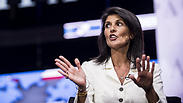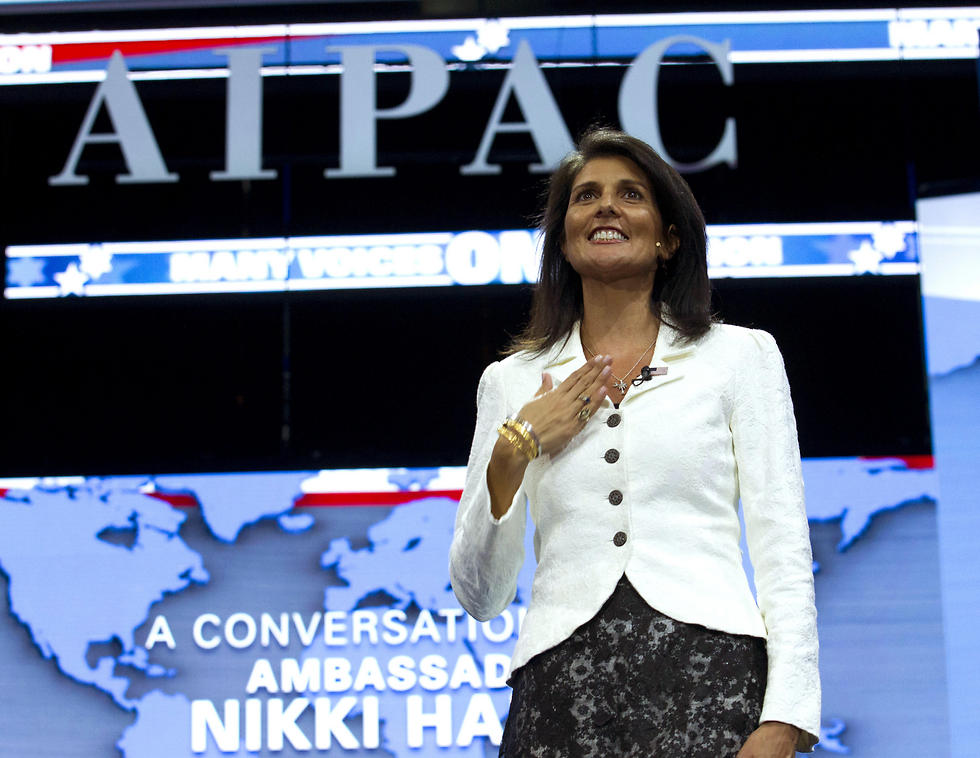
Nikki Haley was addressing the annual American Israel Public Affairs Committee (AIPAC) policy conference for the first time since President Donald Trump named her Washington's UN envoy.
And she drew a clear line under the record of her predecessor, who in December abstained from a UN Security Council vote, thus allowing a resolution criticizing Israeli settlements to pass.
Haley described Resolution 2334 as a "kick in the gut" to all Americans, and warned other UN members that the United States would retaliate against any new attempt to isolate Israel.
"Never do we not have the backs of our friends. We don't have a greater friend than Israel," she added. "And to see that happen was not only embarrassing it was hurtful."
"What I can tell you is that everybody at the United Nations is scared to talk to me about Resolution 2334," Haley declared, to warm cheers from the large pro-Israeli crowd.
"And I wanted to let them to know that, look, that happened but it will never happen again. The days of Israel-bashing are over."
"Basically what it comes down to is that I'm not there to play, and what I wanted to make sure of was that the United States started leading again," she told the lobby group's invitees.
"I wear heels. It’s not for a fashion statement. Because if I see something wrong, I’m going to kick them every single time," she promised.
"Incredibly, the UN department of political affairs has an entire division devoted entirely to Palestinian affairs! Imagine that! There is no division devoted to illegal missile launches form North Korea. There is no division devoted to the world’s number one state sponsor of terror, Iran… the double standards are breathtaking," she asserted.
"Until the Palestinian Authority does what it’s supposed to, there are no freebies for the Palestinian Authority anymore," Haley added.
Trump's administration has already made several gestures to reassure Israel's government that, in Haley's words to AIPAC, "a new sheriff is in town" and US policy has changed.
Haley also vowed that the Trump administration would watch Iran "like a hawk" to be sure it sticks to the nuclear deal. "We’re going to make sure that everything they do is watched, processed and dealt with. Why (the deal) was ever allowed to go through, why it was ever passed, is beyond me. It’s terrible," she added.
Welcoming Prime Minister Benjamin Netanyahu to the White House last month, Trump did tell his guest that he would like Israel to "hold back on settlements for a little bit."
But he and Haley have repudiated the critical vote and he has appointed an ambassador to Israel—David Friedman—with a history of skepticism toward a two-state peace deal.
US officials still insist they support the eventual goal of Israel and a future Palestine living side-by-side within agreed borders—but they will not pressure the Jewish state for concessions.
Israeli leaders, in turn, have expressed confidence.
Ambassador Ron Dermer told AIPAC: "For the first time in many years... there is no daylight between our two governments."
Now, Netanyahu's government want Trump and Friedman to make good on a campaign promise to move the US embassy from Tel Aviv to Jerusalem, which Israel claims as its undivided capital.
Such a move would dismay Palestinians and some Arab leaders, and US officials have not repeated the promise since Trump came to office, but Netanyahu alluded to it in his remarks to AIPAC.
"David, I look forward to welcoming you warmly to Israel and especially to Jerusalem," he said, speaking by videolink to pass a message to the ambassador and his supporters.

















